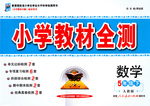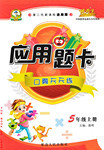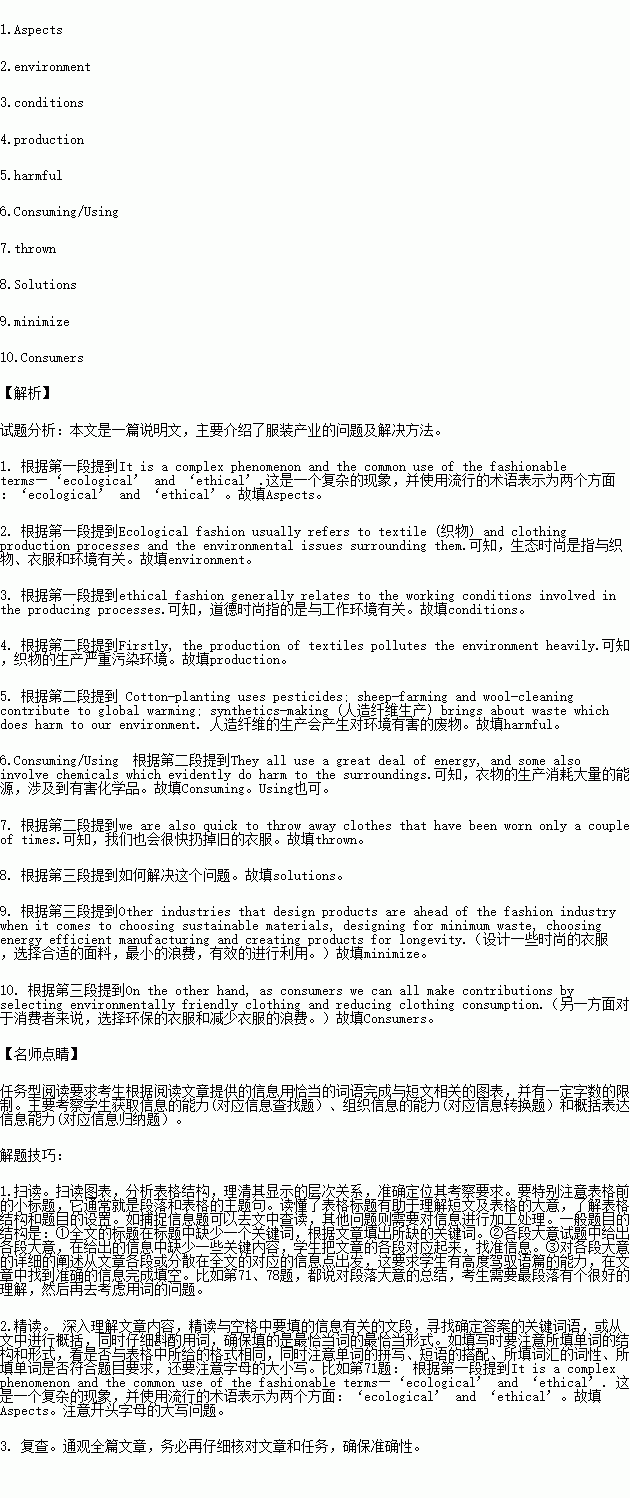题目内容
What is eco-fashion?Eco-fashion is about making clothes that take into account the environment, the health of consumers and the working conditions of people in the fashion industry. It is a complex phenomenon and the common use of the term covers two aspects of fashion —‘ecological’ and ‘ethical’. Ecological fashion usually refers to textile (织物) and clothing production processes and the environmental issues surrounding them;ethical fashion generally relates to the working conditions involved in the producing processes.
What are the problems with fashion? A closer look at the fashion industry points out many problems that are common practices in the creation of our fashions from the field to the factory. Firstly, the production of textiles pollutes the environment heavily. Cotton-planting uses pesticides;sheep-farming and woolcleaning contribute to global warming;synthetics-making (人造纤维生产) brings about waste which does harm to our environment. Secondly, every stage of clothing production has a significant effect on the environment. They all use a great deal of energy, and some also involve harmful chemicals. In addition to this, there is a lot of waste produced in the process, especially in the form of polluted water. Thirdly, growing consumption levels and our shopping habits further worsen the bad effects. We are now buying clothes in increasing quantities without realizing the scale on which it affects natural environment, and we are also quick to throw away clothes that have been worn only a couple of times.
Then, how to solve the problems? Other industries that design products are ahead of the fashion industry when it comes to choosing sustainable materials, designing for minimum waste, choosing energy efficient manufacturing and creating products for longevity. The fashion industry has been slow to adopt these changes and part of the problem is the very nature of fashion. To a large degree, it is the fashion producers that really have the power and the responsibility to shape our future. There are numerous ways in which these producers can reduce their ecological footprint, from switching to green energy and reducing energy use, through selecting sustainable materials and choosing local suppliers,to recycle and minimize waste. On the other hand,as consumers we can all make contributions by selecting environmentally friendly clothing and reducing clothing consumption.
There is some concern that eco friendly fashions are just a trend that we will eventually grow tired of but we can make sure that doesn't happen. Now many people are beginning to shop for organic food products because the benefits of eating food free of chemicals are straightforward and immediate. They relate directly to our personal health. In fact, choosing eco-fashion can also contribute to our personal health, though it is mostly done by way of keeping the health of the planet.
Why choose eco-fashion? | ||
1.of fashion | Ecological | Textile & clothing production processes; Issues related to2. |
Ethical | Working 3. involved | |
Problems with fashion | Textile 4. | Cotton-planting: use of pesticides; Sheep-farming & wool-cleaning: global warming; Synthetics-making: 5. waste |
Clothing production | Producing a lot of waste; Using harmful chemicals; 6. a great deal of energy | |
Consumption levels & shopping habits | New clothes: bought in increasing quantities Old clothes: 7. away quickly | |
8.to problems | Fashion producers | Ways to recycle and9.waste: Switching to green energy; Reducing energy use; Selecting sustainable materials; Choosing local suppliers |
10. | Selecting environmentally friendly clothing Reducing clothing consumption | |
Choosing eco-fashion can contribute to our personal health. | ||
 小学教材全测系列答案
小学教材全测系列答案 小学数学口算题卡脱口而出系列答案
小学数学口算题卡脱口而出系列答案 优秀生应用题卡口算天天练系列答案
优秀生应用题卡口算天天练系列答案
